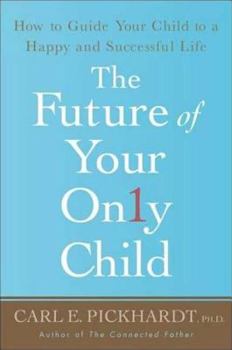The Future of Your Only Child: How to Guide Your Child to a Happy and Successful Life
Select Format
Select Condition 
Book Overview
One-child households havedoubled over the last two decades making it one of the fastest growing family units in America. Expert Carl Pickhardt aids families in understanding the common traits of many adult "onlies"--like shyness, perfection, and intolerance--so that they can better prepare for potential outcomes. He also celebrates the positive qualities of only children and how to encourage characteristics like thoughtfulness, creativity, and ambition. Pickhardt shed new light on issues that many only-child families encounter such as: -attachment problems -conflicts between only child and parent -performance anxiety -unusually high personal expectations -feelings of entitlement -dependence -problems with risk-taking With a distinctive focus on long-term effects, this book will help refine and improve daily parenting methods. Parents will welcome these insightful guidelines for the formative influence they wish to provide.
Format:Paperback
Language:English
ISBN:1403984174
ISBN13:9781403984173
Release Date:March 2008
Publisher:Palgrave MacMillan
Length:248 Pages
Weight:0.56 lbs.
Dimensions:0.7" x 5.5" x 8.2"
Customer Reviews
3 ratings
Excellent book!
Published by Thriftbooks.com User , 14 years ago
I wanted a book to give me some idea of what it might be like to raise an only child without being bias. This book does exactly that. It address potential challenges and resolutions.
Excellent and Accurate!
Published by Thriftbooks.com User , 15 years ago
I'm an only child and have an only child. This book made me realize that my personality had a lot to due with being raised an only child. I would recommend this to anyone who has an only child or was an only child.
The first child is also an only child
Published by Thriftbooks.com User , 16 years ago
As the father of two, I found The Future of Your Only Child stunning - if too late for me. As Pickhardt notes early in the book, the first child is an only child for a time. And the consequences of this fact are not trivial. Had I possessed his book before my eldest had a sibling, would I have been a better father? Almost certainly. I would have become aware of things that I in fact ignored. For example, the fact that a parent can become too closely tied to a child, become too much the child's friend and confidant, for the child's own welfare. Would I also have become aware of how difficult it was for me to do otherwise? I think so, and I would probably have entered therapy much sooner. Although Pickardt doesn't really talk about how parental neuroses impact on the context parents create for children, this is implicit. When he suggests to parents that a particular set of behaviors might impact more healthily than another, the other set lies barely in the shadows. It is up to the reader to choose to perceive and deal with them. Pickhardt is confident than most parents will do so. I think he's probably right.





